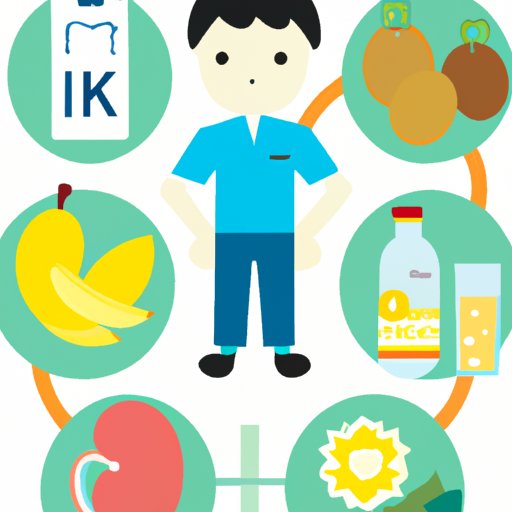Introduction
Keeping your kidneys healthy is essential for overall health and wellbeing. Your kidneys are responsible for filtering out waste and toxins from your body, and when they don’t function properly, the results can be serious. In this article, we will explore what is good for kidney health and how you can keep your kidneys healthy.
Eating a Balanced Diet
Eating a healthy, balanced diet is essential for keeping your kidneys healthy. Eating plenty of fruits and vegetables is important, as they provide vitamins and minerals that your body needs to function properly. Whole grains, lean proteins, and healthy fats are also important components of a healthy diet. Additionally, it’s important to limit processed foods and sugary drinks, as these can be detrimental to your health.
A healthy diet can help your kidneys filter out waste and toxins more efficiently. It can also reduce your risk of developing chronic kidney disease, which can lead to serious health complications if left untreated. Additionally, a healthy diet can help you maintain a healthy weight, which is important for overall health.
Eating an unhealthy diet, on the other hand, can be detrimental to your health. Eating too much processed food and sugar can put you at higher risk for developing chronic kidney disease and other health complications. Additionally, not getting enough of the essential vitamins and minerals your body needs can lead to deficiencies and further health issues.
Hydrating Properly
Staying properly hydrated is another important factor in keeping your kidneys healthy. Drinking plenty of water helps your body flush out toxins and waste, which is essential for proper kidney function. Additionally, it can help prevent dehydration, which can be dangerous if left untreated. Other drinks, such as herbal teas and low-sugar sports drinks, can also provide necessary hydration.
How much water you need to drink depends on your individual needs, such as your activity level, climate, and diet. Generally, it’s recommended to drink at least eight 8-ounce glasses of water per day. However, if you’re physically active or live in a warm climate, you may need to drink even more.
Not drinking enough water can be detrimental to your health. Dehydration can cause fatigue, headaches, dizziness, and other health issues. Additionally, not drinking enough water can lead to kidney stones, which can be extremely painful and require medical treatment.
Exercising Regularly
Exercising regularly is another important part of keeping your kidneys healthy. Exercise can help your body flush out toxins and waste, which is key for proper kidney functioning. Additionally, regular physical activity can help you maintain a healthy weight, which reduces your risk of developing chronic kidney disease. Exercise can also help boost your mood and energy levels, making it easier to stay motivated and healthy.
The type of exercise you do doesn’t matter as much as simply being active. Brisk walking, jogging, cycling, swimming, and strength training are all great ways to get your heart rate up and stay active. Aim for at least 30 minutes of moderate exercise five days a week, or at least 150 minutes of exercise per week.
Not exercising regularly can have negative effects on your health. Being inactive can lead to weight gain, which increases your risk of developing chronic kidney disease. Additionally, not getting enough physical activity can cause fatigue and reduce your energy levels, making it harder to stay motivated and healthy.
Avoiding Unhealthy Habits
Avoiding unhealthy habits is also important for keeping your kidneys healthy. Smoking, drinking alcohol, and using recreational drugs can all have negative effects on your health. These substances can damage your kidneys over time, leading to serious health complications.
Additionally, engaging in unhealthy habits can increase your risk of developing chronic kidney disease. Not only that, but smoking, drinking, and drug use can also cause fatigue, increase your risk of certain cancers, and lead to other serious health issues.
By avoiding these unhealthy habits, you can reduce your risk of developing chronic kidney disease and other health complications. Additionally, avoiding these habits can help you maintain a healthy lifestyle and make it easier to stay motivated and healthy.
Monitoring Medication Intake
Monitoring your medication intake is also important for keeping your kidneys healthy. Certain medications, such as nonsteroidal anti-inflammatory drugs (NSAIDs), can be damaging to your kidneys over time. Additionally, some antibiotics can cause kidney infections if taken without proper monitoring.
It’s important to talk to your doctor about any medications you’re taking, as well as any potential side effects. Additionally, it’s important to follow your doctor’s instructions for taking the medication and ask any questions you may have.
Not monitoring your medication intake can be detrimental to your health. Taking certain medications without proper monitoring can cause kidney infections and other serious health issues. Additionally, taking too much medication can be toxic for your body and can lead to serious health complications.
Conclusion
In conclusion, there are many things you can do to keep your kidneys healthy. Eating a balanced diet, hydrating properly, exercising regularly, avoiding unhealthy habits, and monitoring medication intake are all important steps in maintaining healthy kidneys. By following these tips, you can reduce your risk of developing chronic kidney disease and other health complications.
If you’re concerned about your kidney health, talk to your doctor. They can provide personalized advice and resources to help you stay healthy. Additionally, there are many online resources available to help you learn more about kidney health and how to keep your kidneys healthy.


